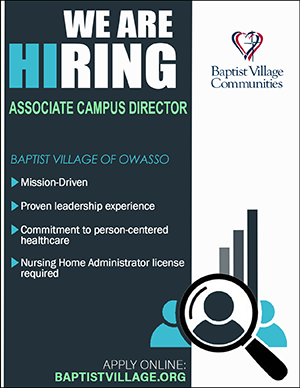“I have become all things to all people, so that I may by every possible means save some” (1 Cor. 19:22 CSB).
When the Apostle Paul wrote this verse around 57 A.D., he was using the best communication technology of his day for sending a pastoral message from his location in Ephesus to the believers in Corinth. Today, Pastor Andy Finch of Choctaw, First and his staff are using every possible means of communication technology to meet the needs of his congregation during these days of social distancing.
Finch and the other ministry leaders on the church staff are reaching out to every member of their church by sending one-to-one personal text messages twice a month. Finch explained how it works.
“We care about our people, like I know all pastors do. We wanted to make sure we are staying engaged with them,” he said. “So we decided we probably couldn’t call everybody because people just don’t answer their phones anymore. So we are texting every adult church family member every other week. We have been doing that for three months now.”
Finch divided up the church rolls into sections. Each week, he and the other four staff members take a list of church member’s names and cell phone numbers, and they send a personal message to each one. Each week they swap lists, rotating so members are getting to interact with a different staff member each time they receive a text message.
“Each text is individualized,” Finch said. “That way people respond very personally. We were saying, ‘We care about you, we miss you. How can we pray for you? Is there anything else our church can be doing to encourage you or help you right now?’ We wanted people to be comfortable enough to share things that were very private, that they would want only us to know about and pray for. The texts are always individual, with personal touches.”
Finch said church members have been responding in surprising ways.
“Early on everybody said, ‘Pray for our health and safety’ because that was what everyone was thinking then,” he said. “People were afraid to leave their homes under any circumstance.”
As the staff continued to communicate through texting, Finch said they noticed a change in the responses. He said church members were asking the staff to pray for their marriages since couples were having to spend even more time together because of requirements to work from home.
“I was really surprised by the number of men who said, ‘Pray for my mental health,’” Finch explained. “I think maybe a year ago that would have been seen as a little out of bounds in our culture. But men were saying, ‘I’m struggling, I’m hurting. I’m afraid.’ They were very open, and it gave us an opportunity to not just read the text, but respond, and I would at that point go ahead and call them and meet with them.”
Finch believes the pastoral outreach has been good for the church members and also for the staff.
“I think it empowered the other staff members,” he said. “People saw that they were sharing in the duty. The ministry that might have seemed more of something the senior pastor would do alone was shared with the other staff. I think it elevates them in the eyes of the people as well. And they have enjoyed that. I have been really proud of them.”
Finch said the texting ministry has been beneficial to the church’s pastoral ministry, and he plans to continue the practice after the COVID crisis has passed.
“I think we are much more aware because the line of communication is so direct,” he said. “People felt much freer to share. It feels like a season where the façade of, ‘everything is fine, and I am okay. And I don’t have any needs’ has exploded right now. People feel safe to be open and honest. (Texting) has proven to be a great tool for ministry.”
Learn more about Choctaw, First using texting technology as a ministry opportunity on the Messenger Insight podcast at baptistmessenger.com/podcast.






